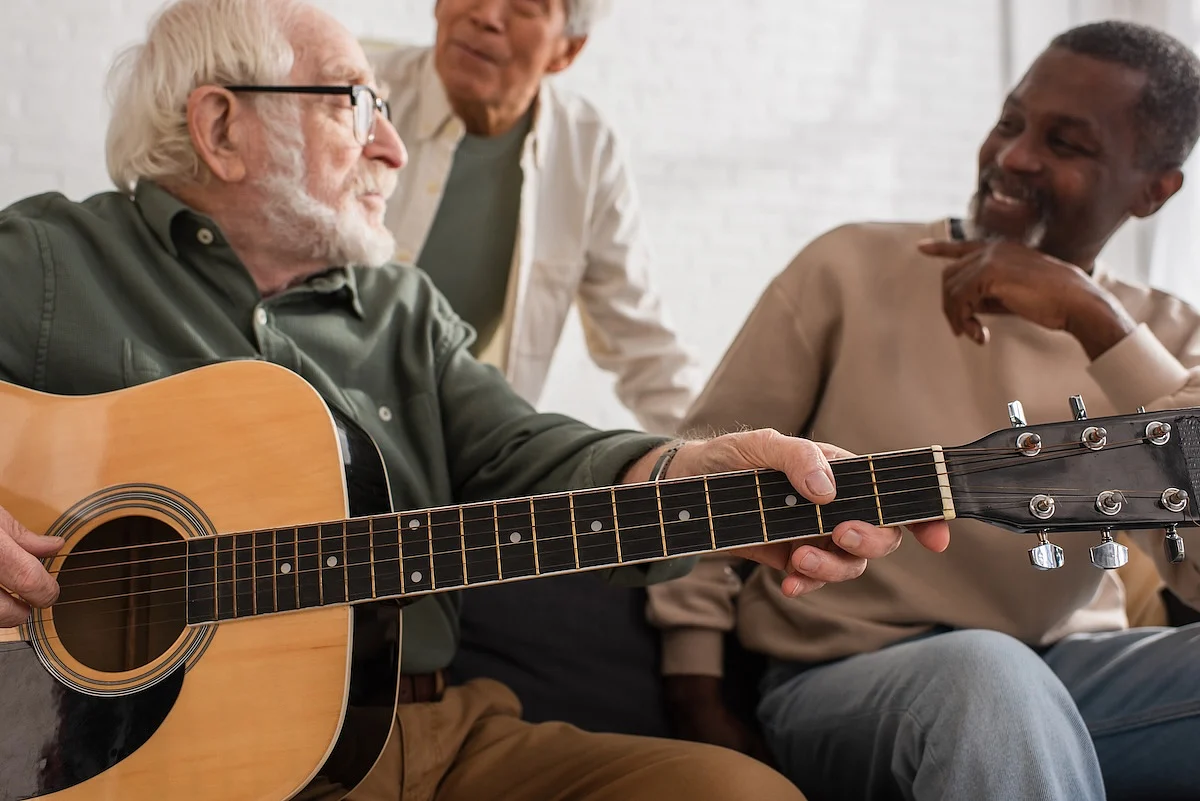Playing A Musical Instrument Might Help Aging Brains
By Dennis Thompson HealthDay Reporter
 via HealthDay
via HealthDayTHURSDAY, July 17, 2025 — Want to help maintain your brain health as you age?
Then pick up a guitar, start tickling a piano’s ivories or join a band.
Playing an instrument can promote a youthful pattern of brain activity, researchers reported July 15 in the journal PLOS Biology.
Specifically, older musicians were better able to understand speech in noisy situations, thanks to more brain power promoted by their musical training, researchers said.
“Just like a well-tuned instrument doesn’t need to be played louder to be heard, the brains of older musicians stay finely tuned thanks to years of training,” researcher Yi Du, a professor at the Chinese Academy of Sciences in Beijing, said in a news release.
“Our study shows that this musical experience builds cognitive reserve, helping their brains avoid the usual age-related overexertion when trying to understand speech in noisy places,” Du added.
Normal aging is typically associated with a decline in people’s vision and hearing, researchers said in background notes. As a result, seniors’ brains tend to work harder to compensate for flagging senses.
To see whether musical training might help seniors better compensate, researchers used functional MRI scans to measure the brain activity of 25 older musicians, 25 seniors who don’t play an instrument, and 24 young non-musicians.
All were asked to identify syllables masked by noise sounds, while researchers tracked their brain activity.
Results showed that older musicians were better able to identify syllables compared to their peers.
Brain scans revealed that music-playing seniors exhibited brain patterns that resembled those of younger people, researchers said.
Harvard Medical School defines cognitive reserve is the brain’s ability to find alternate ways of getting a job done, the result of a lifetime of education and curiosity.
The new study supports a hypothesis called “Hold-Back Upregulation,” which holds that the cognitive reserve produced by musical training promotes more youthful brain patterns, making it easier to manage the effects of aging, researchers said.
They said future studies should investigate whether other means of improving cognitive reserve, such as learning a new language, exercising, taking classes or solving puzzles, might help seniors perform better on memory and attention tasks.
“A positive lifestyle helps older adults cope better with cognitive aging, and it is never too late to take up, and stick with, a rewarding hobby such as learning an instrument,” lead researcher Lei Zhang, a professor at the Chinese Academy of Sciences, said in a news release.
Sources
Disclaimer: Statistical data in medical articles provide general trends and do not pertain to individuals. Individual factors can vary greatly. Always seek personalized medical advice for individual healthcare decisions.
Source: HealthDay
Posted : 2025-07-18 00:00
Read more

- FDA Accepts New Drug Application for Genentech’s Giredestrant in ESR1-Mutated, ER-Positive Advanced Breast Cancer
- Blood Test Can Predict Short-Term Survival Among Seniors
- Satisfaction With Semaglutide Driven by Effective Weight Loss
- Nearly 6 In 10 Women Expected To Develop Heart Disease
Disclaimer
Every effort has been made to ensure that the information provided by Drugslib.com is accurate, up-to-date, and complete, but no guarantee is made to that effect. Drug information contained herein may be time sensitive. Drugslib.com information has been compiled for use by healthcare practitioners and consumers in the United States and therefore Drugslib.com does not warrant that uses outside of the United States are appropriate, unless specifically indicated otherwise. Drugslib.com's drug information does not endorse drugs, diagnose patients or recommend therapy. Drugslib.com's drug information is an informational resource designed to assist licensed healthcare practitioners in caring for their patients and/or to serve consumers viewing this service as a supplement to, and not a substitute for, the expertise, skill, knowledge and judgment of healthcare practitioners.
The absence of a warning for a given drug or drug combination in no way should be construed to indicate that the drug or drug combination is safe, effective or appropriate for any given patient. Drugslib.com does not assume any responsibility for any aspect of healthcare administered with the aid of information Drugslib.com provides. The information contained herein is not intended to cover all possible uses, directions, precautions, warnings, drug interactions, allergic reactions, or adverse effects. If you have questions about the drugs you are taking, check with your doctor, nurse or pharmacist.
Popular Keywords
- metformin obat apa
- alahan panjang
- glimepiride obat apa
- takikardia adalah
- erau ernie
- pradiabetes
- besar88
- atrofi adalah
- kutu anjing
- trakeostomi
- mayzent pi
- enbrel auto injector not working
- enbrel interactions
- lenvima life expectancy
- leqvio pi
- what is lenvima
- lenvima pi
- empagliflozin-linagliptin
- encourage foundation for enbrel
- qulipta drug interactions
